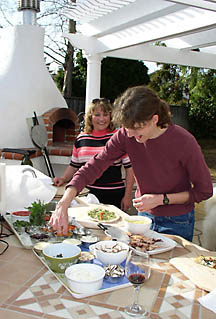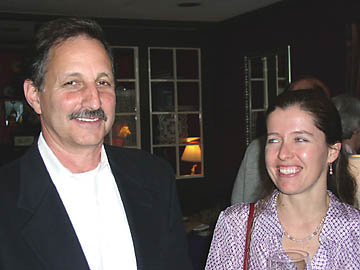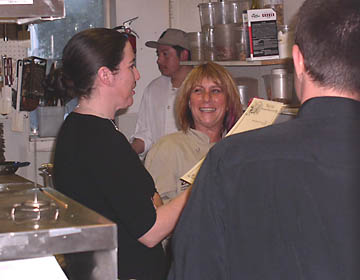
Flavor Notes by Robert Rich: Food, Wine, Restaurants & Recipes
Local Food Topics
Slow Food: In Praise of the Local
by Robert Rich, April 2003, for MV Voice
In 1986, McDonald's opened their first fast food franchise in Rome, at the beloved Piazza Espagna, the Spanish Steps. Journalist Carlo Petrini protested this symbolic encroachment into the Italian culinary landscape by starting the Slow Food movement.
Slow Food encourages people to slow down and enjoy the small pleasures in life, celebrating tradition, good taste, and community; it extols the virtues of regional foods, small growers and sustainable agriculture.
Slow Food's simple message packs enough weight that the New York Times counted it as one of the 100 most important new ideas of the 20th Century. The movement now stretches across the globe, with 70,000 members in 45 countries.
The movement supports educational programs, biodiversity, organic farms, and the preservation of rare breeds and vanishing ecosystems. It tries to promote conservation by highlighting the happiness that comes from eating the fruits of diversity, by combining Epicurean sensibilities with progressive common sense.
The "pleasure principle" built into Slow Food's charter helps it avoid the dire pessimism that hampers other attempts at conservation. Slow Food members get involved because they appreciate quality and good taste, not necessarily because they want to change the world.
Silicon Valley Convivium

The International Slow Food headquarters now reside in Piedmont, Italy, with hundreds of local chapters worldwide, called "convivia". The Bay Area hosts several convivia, the first founded by Alice Waters of Chez Panisse in Berkeley. The Silicon Valley group started in 1997.
I had the pleasure of joining the Silicon Valley Convivium for its fifth anniversary celebration, with a five-course meal at Jesse Cool's Flea Street Café in Menlo Park. Like Alice Waters, Jesse Cool has been promoting locally grown and organic food at her restaurant for over 20 years.
The meal featured meats from Niman Ranch, a Marin based grower of pork, beef and lamb which raises and purchases free-range animals without antibiotics or hormones. Owner Bill Niman himself attended the anniversary dinner and discussed his efforts to raise healthier animals for better tasting meats.

The evening began with passed trays of appetizers including smoked lamb with pear-tomato chutney, cured pork with white beans and egg, and white prawns on ginger toast. Attendees nibbled and chatted like old friends, with animated conversations about local wineries, outdoor education, backyard gardens, memories of South Bay fruit orchards; a friendly soirée of like-minded foodies.
An antipasto platter then arrived at each table, with a delectable assortment of Niman meats and locally made cheeses. Thinly sliced pancetta and smoked beef accompanied grilled asparagus, artichokes and squash. Fresh Humbolt Fog goat cheese offered creamy smoothness next to the musky tang of Midnight Moon aged chevre.
The main course of Niman pork osso bucco came plated with mashed cauliflower and braised winter greens. The pork fell off the bone after hours of slow braising. A red wine au jus sauce with juniper berries offered balsamy bright points to offset the caramelized meat.
Fresh Flavors
At first I though the meat was sitting atop mashed potatoes, or maybe polenta. But when I tasted Jesse Cool's signature mashed smoky cauliflower, I loved its lighter texture and flavor, and the way it absorbed sauces on the plate.

Later, I asked Jesse for the cauliflower recipe. Graciously she explained: simply take a head of cauliflower and boil it for "a long time", until soft. Then mash the cauliflower with some melted smoked cheddar cheese, cream, salt and pepper.
Jesse Cool's cooking shows refreshing simplicity, where the high quality of each component carries through to the final flavors. This food requires excellent ingredients, which explains part of her quest for fresh local produce.
The meal concluded with a salad course of Heirloom Farms bitter baby greens and balsamic vinaigrette, spiced walnuts and Vella Asiago cheese from Sonoma, followed by a light dessert of locally made Massimo coconut sorbet and vanilla gelato, organic strawberries and house-made cookies.
Sustainability
I was impressed by the full flavors of Niman Ranch meats, and by the clarity and balance of Jesse Cool's straightforward cooking. The ingredients definitely made the meal.
Both Bill Niman and Jesse Cool focus on "sustainability" in their approach to raising and purchasing food. To them, this means that the methods of growing food should minimize the environmental impact of farming. Both assert that careful husbandry results in better tasting food.
Bill Niman explained to me that animals raised with hormones develop bland and dry meats. Furthermore, animals raised in tight conditions get more diseases, hence requiring large doses of antibiotics, which also affect their growth.
By allowing the animals to live more naturally, the animals have a better life, their waste products do less damage to the environment, and the resulting meat tastes richer and more tender.
Small growers can't match the large quantities or low prices of agribusiness, so sustainably grown food usually costs more. Jesse Cool told me, "I think we really should pay more for our food in order to have better food. We are investing in our future by seeking sustainable growers."
Since they can't compete on price, small farmers must compete on quality. If the food tastes better, people might be willing to pay more. Hopefully this demand results in a positive feedback loop, where better flavor drives better farming practices.
What is Local?
Slow Food encourages shopping from local purveyors. For Jesse Cool, this means buying foods grown within a two to three hour drive. This way, she gets to know the farmers, and she sees how her food is grown. Her restaurants' menus change with the seasons, as fresh local ingredients change.
Shopping locally strengthens the natural seasonal rhythms of cuisine. Shopping locally also helps the agrarian foundation of our economy, helping to maintain diversity in jobs and incomes, helping our region to balance its growing population.
When I asked Jesse Cool where she first sensed the value of locally grown produce, she pointed to a picture of her father on the wall of the restaurant. He ran a small market in Pennsylvania, selling fresh produce.
When her parents retired to California, he began selling organic produce at the local Farmers' Market. Jesse tells with pride about the day her father died while working at the market, surrounded by friends and family and the food he loved.
As Jesse Cool's father realized, Farmers' Markets offer more than just fresh food. They provide a community where consumers interact with the people who grow their food. Not surprisingly, many people who run Farmers' Markets belong to Slow Food. Local convivium members Ron and Eileen Pardini manage the weekly markets in Sunnyvale, Los Altos and Campbell.
Most local culinary traditions come from making the best use of regional foods when they become available each season. Such traditions once thrived in all cultures, before the advent of widespread distribution and international trade.
Local traditions might seem obvious in Europe or Asia, where culinary histories reach centuries into the past, but these ideas pose puzzles in our polyglot society. What does "tradition" mean in California? All of us arrive with different backgrounds, memories, and tastes acquired from childhood.
Slow Food argues that this very diversity makes life wonderful, and "tradition" means something different for each of us. By sharing our various foods and cultures with friends, around a table, we help to keep these traditions alive. Perhaps while enjoying such pleasures, we unwittingly build new traditions.
Simple Goals
Some may find it Quixotic, trying to change the world by eating better. Slow food members find it easy and fundamental. Some may think Slow Food merely justifies expensive culinary hedonism. Slow Food members feel that they are investing in a sustainable future, while living more simple and healthy lives.
By spreading the gospel of good food and friendship, Slow Food hopes to guide change with seduction rather than dire preaching, with a carrot not a stick. Making the world a better place might start at home, among friends, one bite at a time.
Slow Food Silicon Valley Convivium
www.slowfoodsv.com
Slow Food USA
website: www.slowfoodusa.org
email: info@slowfoodusa.org
phone: (212) 965-5640
Membership $60/ind., $75/couple
Flea Street Cafe
3607 Alameda de las Pulgas
Menlo Park, CA 94025
(650) 854-1226